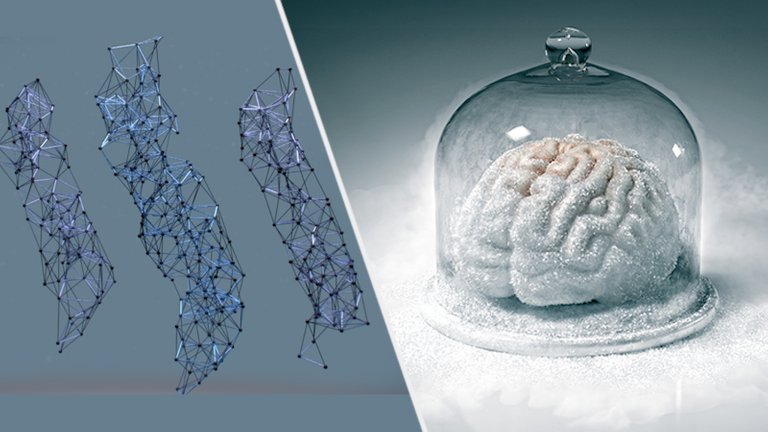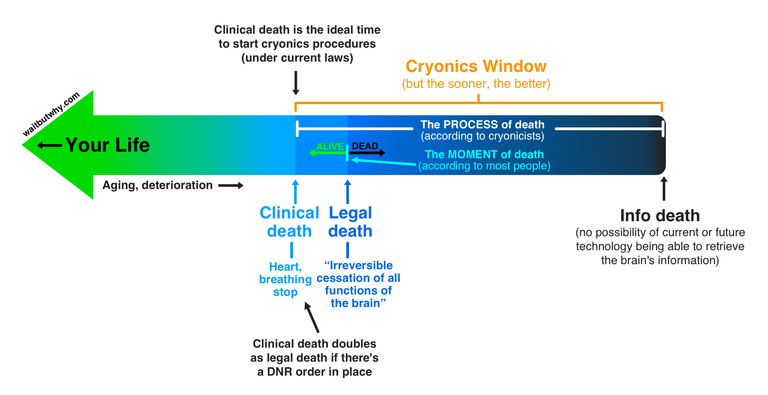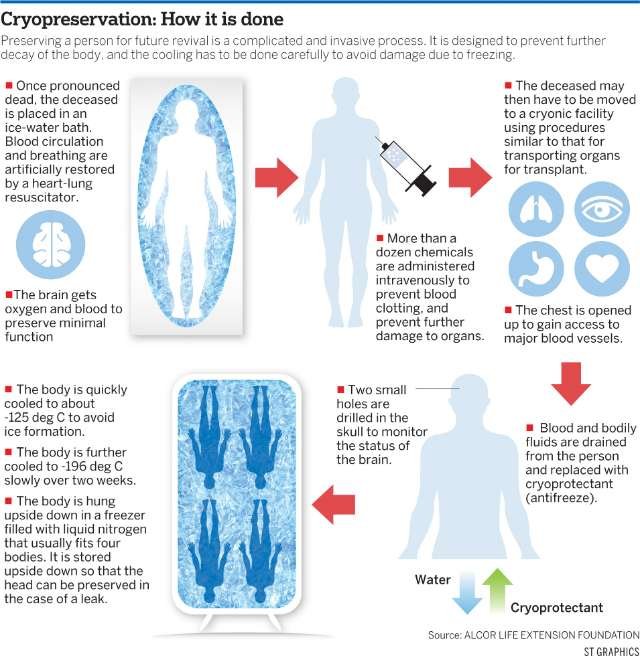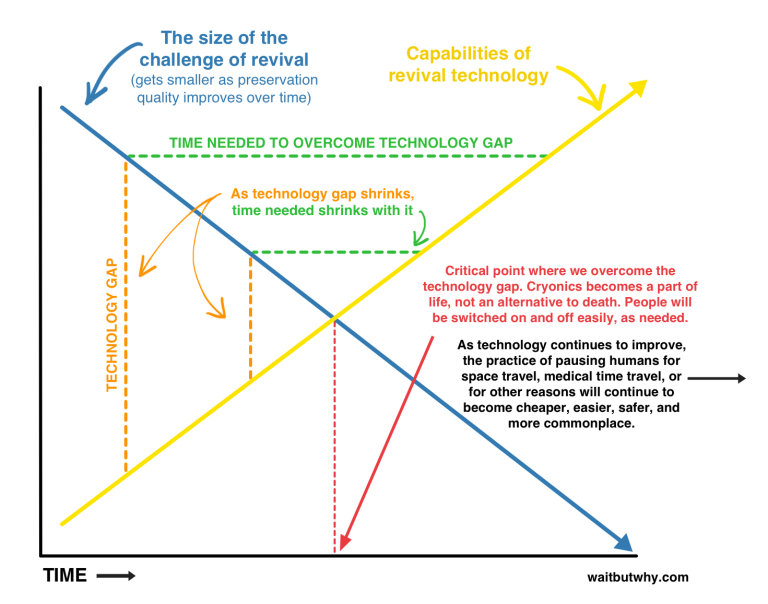
Do you know the story of Captain America? In the Marvel tales, he was frozen for several decades and came back to life later on.
Obviously that's just a fiction story, but scientists are actually doing similar things to people that have died - they freeze them, and hope to thaw and cure them again in the future when technology is much more advanced.
This is the very basic concept of Cryonics.
Cryonics History & Info
The thought of freezing someone and reviving them in the future was first published by physics professor Robert Ettinger in 1962. Since then, it has been a popular topics in many sci-fi movies, books and games - but until today, no one knows if it will actually work.
The first person to try this was James Bedford, who died of cancer in 1967 at age 73.
Since then, about 300 people from around the world havea agreed to the same procedure.
There are 4 major nonprofit organizations in the world that execute this cryonics process, and it's very expensive - depending on a lot of factors, it can vary from $50,000 to $250,000.
A few thousand people are als members of these organizations - which means that they have already signed up to be vitrified (the corrct term for 'frozen', as I will explain later on) as soon as they die.
The definition of death
It might sound pretty strange that scientists are trying to freeze dead people, and hope to revive them later.
But the definition of "death" is actually very complex.
Until mid-20th century, a person was declared when their heart and breathing stopped.
But since technology advanced so much in the last few decades, the legal definition for a death had to be changed to someone with "irreversible cessation of all functions of the brain".
But if you think about it, declaring someone as dead really means that there's no possible chance of survival under the current circumstances.
For example:
Let's say someone's heart stopped 15 minutes ago as he arrives to a primitive hospital in a small village in India.
They would be pronounced dead, because the hospital doesnt have the ability to revive someone whose heart stopped longer than 6 minutes ago.
But if the same person gets to a High-Tech hospital in New York, where they have a technology to revive someone even if the heart stopped 30 minutes ago, they're not technically dead and still have hope to be revived.
That's what cryonicists think - but instead of a different location, they think of a different time where they will be a cure for someone that's currently pronounced dead.
That's why cryonics companies view their patients as patients not corpses, and assume theyre not dead, they just need to be healed in a different time.

How does it work?
If you are a member of a cryonics organization, you wear a bracelet and necklace that informs everyone twhat should happen to your body if you suddenly die.
The ideal death for a cryonics patient would be to start the process right when the heart and the breathing has stopped - if you have a terminal illness like cancer, you can even prepare yourself to die in a special hospice.
If you die under different circumstances, for example you're found hours after death or your organs have already been damaged due to an accident, the process is less likely to be successful, but still they will do everything they can.
Then, the most important part of the cryonics process happens:
The person gets cooled down to -196°C (-320°F) with liquid nitrogen.
This is actually called vitrification - not freezing. There's a big difference.
Our body is mostly made up of water, so if you'd just freeze someone, the water in their cells would form crystals, and as soon as the person was thawed their membranes would burst, their blood vessels would be totally damaged and their cells would be dehydrated.
So the difference with vitrification is that the blood is replaced with a cocktail of chemicals - called "cryopreservants".
These are essentially like anti-freeze - they turn into a solid without any crystals.
But this method still has a lot of risks - the organs can still easily be fractured, and no one knows if and in which condition a brain could "survive" this process.

Progress
Vitrification is currently already being used to preserve embryo cells in IVF therapy - successfuly.
But obviously, preserving a small number of cells is much easier than preserving a whole body.
Experiments with a rabbit kidney were also successful - the kidney was vitrified, and later on re-attached to a rabbit. The whole process worked fine.
But then again, a human brain is much more complex than a rabbit kidney, and we don't even know how much of consciousness is left in a "dead" brain.
Vitrification has a large potential for organ donations though, because the donor's organs could be safely stored in a good condition until a perfect match was found.
Challenges
There are A LOT of "if's", skepticism, and critical questions.
We are still very far from actually reviving a real, vitrified human, and getting him back to a normal health level.
First of all, you would have to be able to thaw the person and treat the damaging effects of vitrification.
Then, you need to cure what initially killed the person.
And that would only be possible if ...
- If the person legally died in a way that didn't do too much damage to any of the organs, especially the brain
- If the cryonics company can store the patient safely, and without interruptions (What if the company goes bankrupt? Or society is facing war, or a natural disaster happens?)
- If our technology gets so advanced that it could actually bring someone back to life after vitrification, without negative effects
- If the future society actually decides that that point has come and takes explicit action to revive them
There are so many challenges tht this post would get way to long if I actually listed them all - like I said, we are still very far from actually reviving someone after vitrification, and there are near endless risks and possible scenarios to think about when researching this topic.

Personal Opinion
I personally am neither an active supporter nor a critic of cryonics - I believe that it might make sense in some cases where the person would otherwise die really young anyway. So they might as well try this way - maybe they'll be revived, or they'll never wake up, which would be essentially the same outcome as dying right away.
Images: 1, 2, 3, 4, 5, Sources: 1, 2, 3, 4
- Instagram -

© Sirwinchester
I do not believe that cryogenically frozen people will ever be revived.
Mostly from a perspective of understanding reincarnation.
Time just doesn't work that way. You can't be transported to a (future) world where everything is all better because you are part of the problem. The problem has to be solved within you first.
And for a very physical reason why this won't work.
Organ donors have to be living while their organs are removed.
After they are dead, the organs are useless for transplanting.
Yes, this means that organ donors are chopped up while they are still alive.
(one of those dirty little secretes hospitals never tell anyone)
Does the Governement Own Your Organs? What You Don't Know Can Kill You. Dr. Byrne MD
Very interesting, thanks for sharing - yes that's right, organs need to be transplanted when they're still fully functional.
Cryogenic freezing can't guarantee that the organs will be intact again.
But that's exactly the point - these people don't know if they will wake up again.
They simply HOPE that during the time they're frozen, science and technology will develop so much that scientists will find a way to make frozen organs work again.
Reincarnation is superstition . . the intention behind Cryonics does not violate any physical laws and is theoretically possible.
And, you probably think that you are on the side of logic and reason.
Well, unfortunately there is a huge pile of evidence for reincarnation. Libraries and libraries of books on it. (most not yet translated) There is a mountain of research that shows there is something to this. And the person stories are legion.
And what does "science" have? Nothing. Science believes that we are just a collection of atoms that randomly formed to create our universe, and we have to continue to believe this or else all our work falls apart.
So, reincarnation has lots of evidence.
Reincarnation is superstition is a belief based on nothing.
Your last line is correct:
"Reincarnation is superstition is a belief based on nothing."
By definition, brain freeze.
Curious to know what would happen if someone was frozen and years later revived.. Hypothetically. What would the person be liked? Completely disorientated to the point the body died of shock? Would the skin be completely disfigured?
Hopefully this never happens while I am alive. To hard to comprehend.
These are exactly the questions that no one really has an answer to.
The people that did it anyway are just desperately hoping that science will advance enough to find solutions to these problems in the future.
Maybe in the future even your body is dead your mind will live in a dream forever, like in Vanilla Sky movie.
the reality is coming closer and closer to science fiction movies!
Why would anyone who is perfectly healthy go through this process consciously. I mean the theory is great but it really does make sense for some to opt for this if they suffering from an incurable disease and are hoping that some day in the future they may be revived when there is a cure available.
Anyways if you believe in life after death then I would rather take on a new body than to keep myself in a limbo for an unknown amount of time ;)
Yes, people either sign up to get this procedure done when they're about to die, or when they already know they're terminally ill. No healthy person would do it on purpose.
And yes you're right, starting a new life in a new body would actually be much better than being frozen and having the risk to never wake up at all
Wouldn't that be awesome if we could !! Im sure Walt Dysney is frozen ! Thanks for the up vote , upped and res teemed back ! Thanks for sharing , great post !👍👍👍
Thank you for the support! 🙌
Yes it would be amazing if we could freeze one of the most influential people in time and revive them later on
for sure ! And why not !! I always heard that Walt Dysney was frozen !? I mean he certainly had the money to do so ! Steem on my friend ! 👍👍👍
I have seen recordings of frogs being completely frozen and later on defrozen, and living through it. The question is: how much of our cognitive functions do we retain?
Yes that's exactly the point. Experiments with animals and with single organs were a success, but it has never been done with a whole, living human being before.
That's why everyone who does this knows: they will be frozen for a long time. And they hope that during that time, science will figure out a way to defrost a complete human body without negative effects.
Let us find volunteers!! :D
omg it seems possible to bring the dead to live again in the future... I watched a documentary about a sick rich man who wants to keep his body 'alive' for hundred years and wake up when the technological level is high enough to cure his disease... but it brings a lot of problems, e.g. population growth. Maybe live a 'non-renewable' but fruitful life for once is a better option :)
Yes, sounds like the same technique as cryonics.
You are right, it comes with so many ethical and economical problems, it's hard to even imagine all of it.
Good job on the article! I think Vitrification might not work unless it could somehow be improved. I actually wrote a article recently on the possibility of immortality. I think that will work out better.
as long as they find a way to upload my
ghost in a shell
all gonna be a ok ^^
upvoted and following
Thank you!
And yes that's right, a concept similar to ghost in the shell would be amazing to live eternally
I think the ultimate goal of people becoming eternal is that the mind of human is transcribed into data and implanted to a artificial bodies. Just like the ghost in the shell:)
That might be another option for the future. thanks for your input!
Great and informative post as always :)
Thank you! I appreciate the feedback!
No matter how much does the science evolve death is inevitable, both practically and philosophically.
Yes that's true, but it depends on how you define death.
I agree that one life can't really be infinite
Ve interesting post @sirwinchester, I'm glad I have found it. I will follow you to see more in the future :)
Even if this was possible I think that the human brain will be overwhelmed by such a process and will damage itself to the point that it becomes useless.
Yes that could be true as well. Science and technology would have to advance A LOT in order to make this possible.
Yeah..a few hundred years I guess. Then maybe we can fly too 😛
very good @tantawi
While I doubt people frozen can be brought back to life, this field of science does fascinate me!
Nope
the human mind is a standing wave created by the neurons of the brain.... firing.
once it is extinguished...it's gone.
just like a program running on your computer. when you turn it
OFF.
Yes that's true. I guess these people are hoping that there's an opportunity to switch it back ON once time has passed
if they do that then it won't be the same person.
it'll be someone else.
Hellow @sirwinchester I followed you, so I read all your stuff I like, so I chose it. Unfortunately, my minnow vote is not worthy of you. I have tried to shift my subject to see if I am getting a bit of charm. Hmmm one shows $ 3.50 and one today has reached $ 9 maybe we need to understand our audience here. Look at them as consumers. What are they hungry Maybe, I keep trying new corners.
$9 is actually not bad for someone who just started on steemit. you can't really compare my statistics to a new member since I've been blogging for almost a year now.
The most important thing as a new steemit user is to build a follower base and engage with the community, that's how you get regular readers and voters.
Interesting article. We will all become mister freeze then haha
great informative post ...
Is this where Walt Disney is?
wow nice research you have done @sirwinchester
'Don't freeze me, Bro!!' I don't want any part of that LOL....Hopefully on to bigger and better things, so don't want to come back to this plane!
Great post. But, in the final analysis, would we want to come back and live in a world where we were so obsolete and didn't understand the world around us?
I guess that's a topic for another time.
That's a good point as well. apart from all the biological and scientific problems, it would be a whole other question if the "frozen" person could become happy again, in a totally new world without knowing anyone.
great post @sirwinchester ...!
awesome information :)
thumbs up...:P
I don't think it's a good idea to freeze people and wake them up later. The costs of this would be enourmous and I think it will add much to the quality of life.
I think the recources put into these projects are of better use somewhere else.
A really interesting post! I once saw a documentary about this, can't remember the name, but it kept me wondering if it would really work for a long long time! Hopefully in the future :)
''If the cryonics company can store the patient safely, and without interruptions (What if the company goes bankrupt? Or society is facing war, or a natural disaster happens?)''
Haha thats the worst case scenario that is very close to reality. Think of a war or something happens and the freezer with you inside ends up on a dumpster or you get eaten by worms haha :P Jokes aside they could lunch it in shorter amounts of time lets say 10 years in which let's say we can ''forsee'' the future more accurately than 30-40 years
Who knows, that might actually happen, some of these people are preparing to be frozen for 100 years or more!
I will never consider it. It's almost the same to be buried alive and tell a person to remember to come and excavate you no thanks
This post has been ranked within the top 10 most undervalued posts in the second half of Jun 07. We estimate that this post is undervalued by $121.46 as compared to a scenario in which every voter had an equal say.
See the full rankings and details in The Daily Tribune: Jun 07 - Part II. You can also read about some of our methodology, data analysis and technical details in our initial post.
If you are the author and would prefer not to receive these comments, simply reply "Stop" to this comment.
@sirwinchester Thanks for sharing this article. I'm still undecided on whether this will ever work. But even if it did, the big question is how long would you be willing to wait to be "cured"? What if that's 20, 40, 50, 60 years. I almost feel like you would be starting your life over in a time in history that you may not be able to adjust to.